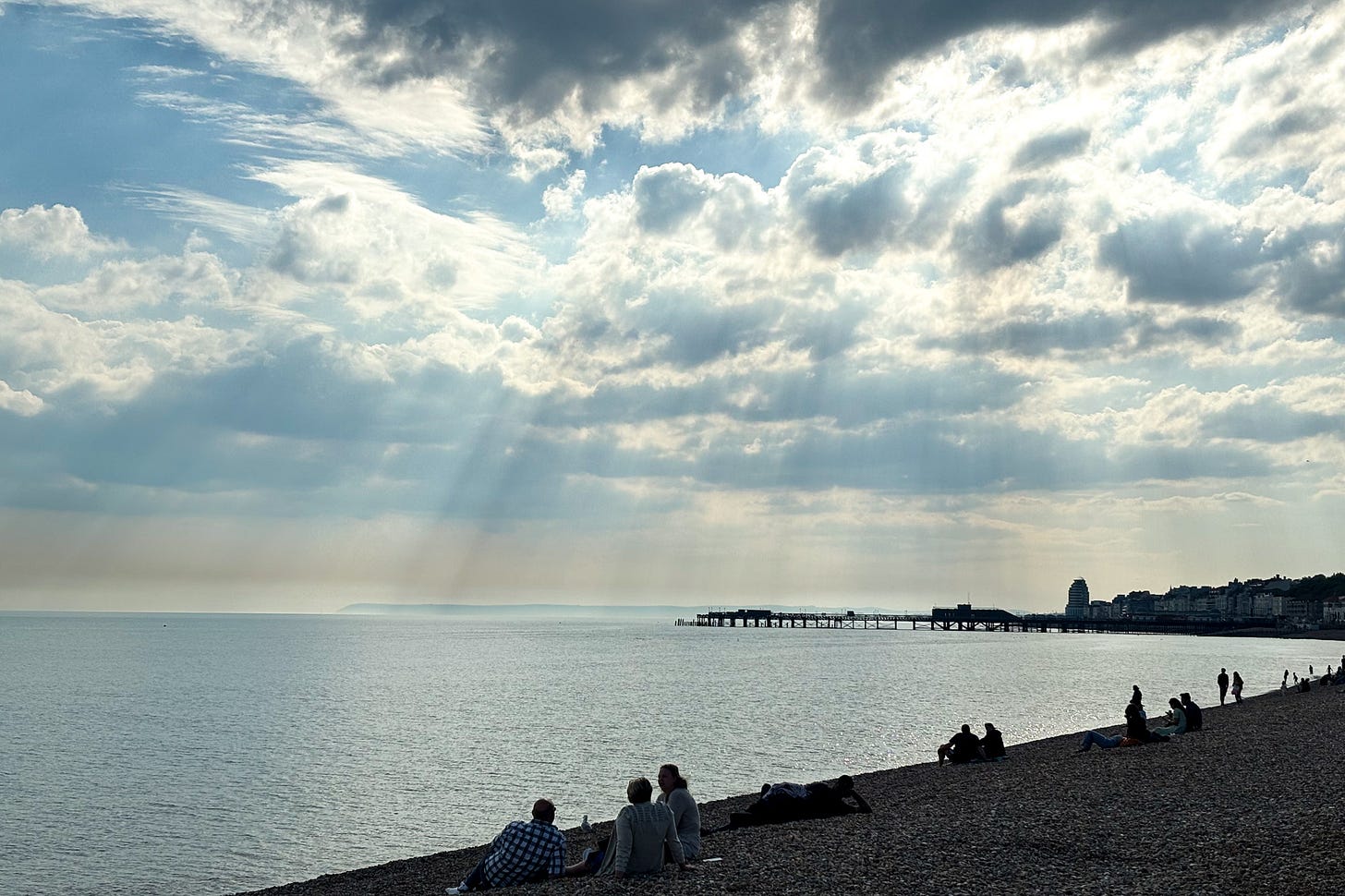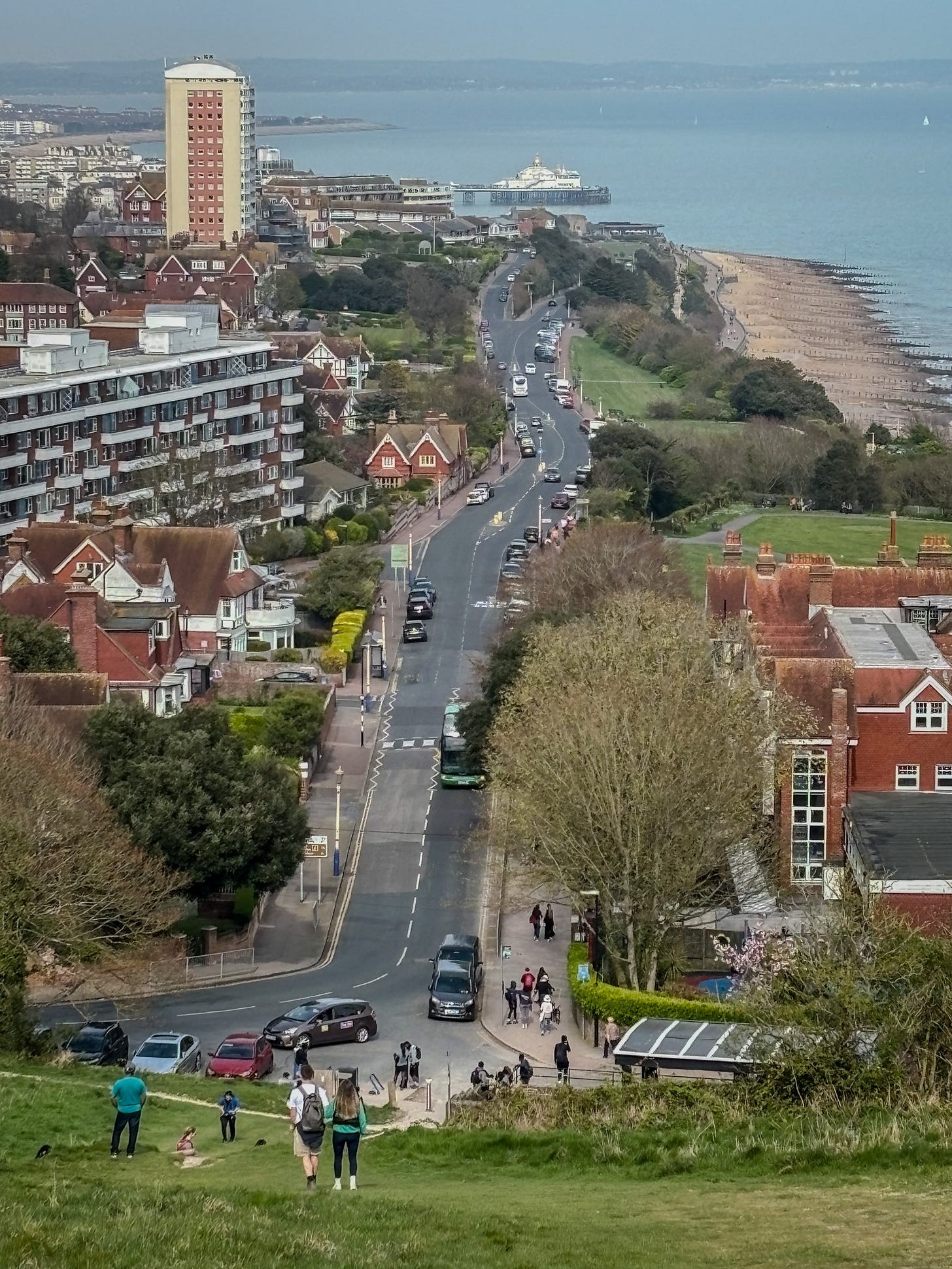How I stopped my excuses
With Win Stacking
It's Saturday and I'm leaving for a ride in 3 hours. It's a first bike ride away from the local paths. 30km on the beautiful British south coast from Eastbourne to Hastings - a part of my South Coast Epic where I do 200 miles from Littlehampton in Sussex to Faversham in Kent.
I'm scared.
The usual train connection doesn't work today. I don't really know where I'm going. It's my longest single ride so far.
A month ago I would find a reason to skip it.
Today I have a plan and I'm preparing to go as I write this article.
Because I climbed a hill. Twice.
The Seven Sisters Hike
Two months ago, I went for a hike over the white British cliffs.
The coast may seem flat, but it's a constant climb from one cliff to another. Steep one. This is the view from the last descend close to Eastbourne and there are like 10 of them on the route.
I wasn't that fit, so after the first 3 climbs, I struggled. "FFS, another climb." - I thought. I was too stubborn, and I persisted through the climbs.
Until the one when something clicked.
I stopped bitching about yet another climb like I'm a victim.
The thought became "I own this hill".
The hill didn't change; it was as hard to climb as before, but my perspective changed.
It got easier.
The Addington Climb
Addington is a town in south London with a steep 500m climb.
Going for a ride last week, I was planning to avoid it. It was my first long distance bike ride after a long break, so I wanted to keep it flat. It was all good until my GPS put me at the bottom of this hill.
I thought I'm too weak. I thought I won't make it. I thought I will be too tired after the climb to continue.
Then it happened again. I remembered the previous climb. The determination kicked in - "I own this hill".
It was tough. I had to take a break at 3/4 when I bonked - I lose all the steam. My legs were shaking, I was panting like St Bernard's and my heart was racing at the max speed. But I got back up, and I ground it up to the top.
I owned the hill indeed.
I got a drink and a snack at the top and I collected a fun 30 mph 50 km/h descent, but the biggest reward is the memory.
Fitness Imposter
My hill experience is a fitness imposter syndrome.
I don't trust myself that I'm good enough to make the climb, so I either do a minimal effort just to survive or I skip it altogether. I will then rationalise. For safety, or to preserve energy for later, or to not look silly amongst other hikers and riders.
I won't do what I wanted and I feel good because I had a good reason after all.
I'll repeat that behaviour, and it becomes a pattern.
I repeat making excuses for a long enough time and it becomes a habit.
That's how the brain works. Through experience and repetition. If it worked, if I felt good after, it must be the right thing to do.
It's because the brain doesn't work for my success - it works for the preservation of the species.
The Win Stacking Strategy
The good news is that the brain learns the same way, either it's a good or bad habit - by experience and repetition.
The process is simple, but not easy.
If you struggle with imposter syndrome at work, or in any other area of your life, you need to experience courage. The great thing is that the brain is stupid, and it doesn't distinguish between types of experiences. Fear is fear.
The goal is to change how you react to it.
1. Pick a small, but meaningful challenge
The first goal is to win. Even if it's so easy, it doesn't feel like a big deal.
My first wins were literally walking in the park. The first change was from having to do them to going out with intention. If you don’t want to do it, no amount of forced discipline will help.
If you're an engineer and you want to become a leader in your company, but you struggle with speaking up in the meetings the first step can be just going to all the meetings you can and surviving through them until you build up an intention of showing up.
When the feeling change from "I must do it" to "I want to do it" you made the first step.
2. Focus on winning
Celebrate every win, no matter how small it can be.
I will feel cringe and silly to begin with. I remember I thought "it's not a big deal, why should I be happy about 15 min walk?". I was comparing myself to the standards of others, not to myself. For me, a 15 minute’s walk was a monumental win after 7 years of sitting on the sofa.
I celebrated with a good, fat burger. (My diet changed since then and for another reason. If you want to hear that story - let me know in the comments.)
If you're not joining the meetings and you don't feel your opinion matters and you answered someone's question - celebrate speaking up. You opened your mouth and spoke about the problem. Put the judgement aside, celebrate the act of speaking.
It sounds cringe if you compare yourself to others, but it's the step they took a long time ago before they got confident and you're following in their footsteps. The only difference is that you do it consciously, when 99% of people don't know how they got their skills.
3. Challenge, Win, Repeat
Two experiences are coincidence, three make a habit.
From a walk in the park to coastal hikes to cycling in the park to cycling away from home. I'm slowly ramping up the level of challenge. Slowly is the keyword and the main reason I failed in the past.
I went too big too early.
The Win stacking is about building momentum.
When I was trying in the past, I was too impatient and wanted to jump before I could walk. I didn't have the confidence that I can constantly win. Big failure put me off for months.
Failures happen, and you need to build enough wins to budget for setbacks. If you just started playing, every loss hurts. If you won 100 times already, one loss isn't significant.
Back to our meeting example - be shy and quiet, answer questions and speak up once in a while, celebrate the win. Repeat what's easy for you. Don't risk a failure until you build enough confidence to withstand criticism or rejection.
Be patient
I can't stress it enough.
I looked for the opposite of patience for 20 years. I wanted a revolution, the magic pill that will change me overnight. I wanted speed.
My fitness change I described is a year of work. Walks spread over multiple weeks. First big hike in September 2024. First big ride in May 2025.
Change takes time.
I don't feel the change I make day-to-day. I had a few a-ha moments, but most of it is invisible at the day. If I look a year back - I'm a different person over 365 unnoticeable changes.
The genuine change happens in the unconscious - you can’t logic yourself through it.
Rising to the challenge
It's Sunday morning, I can feel yesterday's 20 miles / 30 km in my whole body, but I’m happy I did it.
I was worried about going on the train with the bike. I messed up platforms changing the trains, and it was chilly and I didn't pack an outer layer. I was worried my whole way to Eastbourne and I thought multiple times about turning back, but.
The habit of riding won because it had a higher level than the sum of worries I had.
If you really want to change, stop reading and start living.
PS: What’s your story?
What's your story? Are you dealing with Impostor Syndrome or anxiety? Or maybe you want to vent how hard it is to change? Or maybe you're ok and want to get better?
I want to speak to you. I'm curious about what worked and didn't work for you. Use this link or reply to this email and let’s chat.




